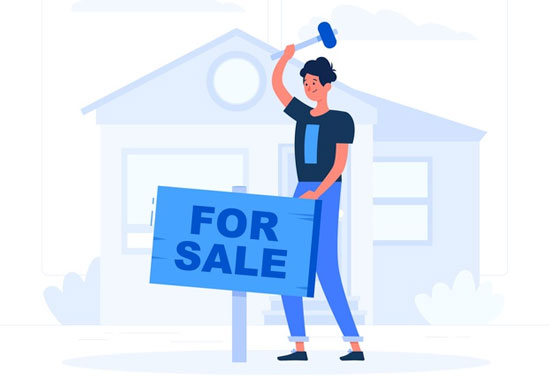Home Closing Guide: Closing Costs for Sellers – Essential Information
Selling a house comes with a lot of strings attached and can seem intimidating. There are so many requirements and associated closing costs for sellers that knowing the extent of the transaction can be difficult.
In addition, the expectations placed on both sellers and buyers have changed. You are not expected to fill the same role as was once the case.
Closing costs for sellers are an inevitable part of any real estate transaction, but figuring out who should pay what is as much a matter of etiquette as it is regulation. There are as many types of seller closing costs to consider as there are transactions. It is important, therefore, to be aware of these before being confronted with them.



Estimated Closing Costs for Seller
Not all of the following will be typical closing costs for the seller. Several are the responsibility of the buyer, and it is at the discretion of the seller whether they want to cover these. This review will narrow down what is relevant in different contexts and provide information on how much you might pay in average closing costs for the seller.
There is always some level of uncertainty when commissions and property values are concerned, but plenty of tools and advice are available to help you predict those seller closing costs.
Though the seller pays additional closing costs more frequently than in the past, this need not result in the burden falling entirely on them. Understanding of the markets and fees involved is key to answering, “How much are closing costs for sellers now?
See Also: ConsumerDirect Mortgage Reviews – What You Need to Know! (FirstBank Mortgage & Review)
Payment etiquette – Who pays, buyer or seller?
The number of payments involved in a typical transaction can vary wildly. Typical closing costs for sellers are much higher than for buyers, but buyers must worry about many different individual fees. There are some fees that can be paid by either party. This is generally a matter of etiquette, but it can be down to the personal circumstance of the seller.
These ambiguous costs include (but are not limited to):
- Attorney fees
- Title service costs
- Recording costs
- Home warranties
- Pro-rata property taxes
- Pro-rata homeowner association dues
In many cases, these are covered by either the buyer or seller as part of an arrangement, but sometimes the costs are split. Older buyers may cover these closing costs themselves as a matter of course. In areas with low competition, however, it may be expected that the seller pays closing costs.
It used to be standard practice for the buyer to cover most of these ambiguous costs themselves. It is increasingly common, however, for sellers to pick up some of the cost for this in exchange for a higher price on the property or faster closing of the deal. Since seller closing costs tend to be higher than buyer costs already, a seller should make sure it is worth their while before agreeing to this.
Reasons for sellers to absorb more closing costs
It might seem counterintuitive, but it is often more profitable for a seller to take on more closing costs than they need to. Despite higher seller closing costs generally, absorbing more of these costs makes the property more appealing to buyers. This is especially true for inexperienced buyers, for whom the range of closing costs can be intimidating.



Average Closing Costs for Seller
In an uncompetitive market, it is unlikely that they will need to do this, which keeps the average closing costs for sellers low. In more competitive markets, however, it may be necessary to take on more closing costs in order to stay ahead of the competition; buyers might even base their purchase on the seller’s accommodations.
This can also cause buyers to close sales quicker. This is a benefit to both parties; it results in lower pro-rata and interest charges, and it reduces uncertainty. If the seller pays closing costs, it can also result in a higher overall sale price, as passing the fees to someone else gives the buyer a clearer picture of their final purchase amount.
It’s a big draw for buyers for short-term financial reasons, too. A $5,000 price reduction in the cost of the property will only amount to a few dollars per month over the course of the buyer’s monthly payments. But passing some of the closing costs to the seller allows a buyer to save considerable amounts in the short term.
Don’t Miss: Credit Score for Mortgage Loans for this year (Good Credit Score Needed to Buy a House)
All-in-One Change Management Tools
Top Rated Toolkit for Change Managers.
Get Your Change Management Tool Today...
Closing costs for sellers – seller-only costs
Though many fees can be shared by buyer and seller, there are certain estimated closing costs just for sellers. The most significant of all the closing costs, the real estate/brokerage commission, is one of these. This is based on a percentage of the total sale price. The actual percentage is highly variable; this can range from 4%, according to some sources, between 5-8% according to others, and even up to 10% from still others.
Assuming an average fee of 6%, which is typical according to TIME Magazine’s Money 101 section, it becomes clear why much of the financial burden is in seller closing costs. For example, if a home is sold for $350,000, this fee comes to an additional $21,000. Even before accounting for negotiated costs in other areas, this is a sizable additional cost to consider.
This demonstrates the importance of being full aware of all costs involved, since the amounts are typically very large. A seller closing cost calculator is an essential tool to ensure clarity about seller closing costs in each case. As a seller, shouldering the burden of additional costs to appeal to a buyer is not a decision to be made lightly.
Closing costs for sellers – shared and negotiated costs
The costs that can be split between parties or negotiated are clearly defined above, but how much are these closing costs for sellers in practical terms? As discussed, it is possible that a seller may not pay any of these and leave it to the buyer, but this is not as standard as it once was.
If the local market has a lot of first-time buyers, as one example, then other sellers in the area are likely to cover a significant portion of the closing costs.
It is important, therefore, to be able to calculate these in the event that an important buyer demands it. Some real estate agents will do this for you, but not all do; expect to pay for the service in most cases when it is offered.
Almost all agencies offer calculating software on their websites, however, which can be very useful in figuring out optional seller closing costs yourself. A closing costs calculator for sellers is now a standard tool, so even if a specific agency does not offer one, finding one is a simple matter.
A seller needs to be aware of what is expected based on the market around them and the individual expectations of the buyer. A meeting with the buyer or their representative is a good way to come to a deal that works for both parties, though it can be time consuming.
Alternatively, a seller’s closing costs and time spent can be kept to a minimum if they determine what they are or are not willing to cover in advance and require the buyer to meet that standard.
Related: Guild Mortgage Reviews – What You Need to Know (Company Reviews & Complaints)



Closing cost calculators for sellers
There is a wide range of seller closing costs calculators available for use for free. Many estate agencies will offer one on their own websites; otherwise, here are a few seller closing cost calculators that are useful for general use and carry specific settings for charges particular to the state the property is in:
Many of these calculator sites also include numerous additional advice articles and tools. MyFico, for example, offers an easily navigable list of additional advice for searching for good deals in your market. Mortgage-Investments also offers a wide range of other calculation applications, such as a tax calculator, and clear tutorials on how to use them.
With these, calculating typical closing costs for sellers is made relatively simple. Simply choose the one that is easiest for you to use or comes with the most useful extras.
There are also some state-specific calculators that will account for any additional closing costs for sellers not found in other areas.
These are most useful if a seller is only selling in one area, as it can help them avoid any nasty seller closing cost surprises. These can be easily searched for, or your estate agency can direct you to closing costs calculator for sellers they prefer.
Average closing costs for sellers in different markets
Given the large differences in types of closing costs and in the housing markets of each U.S. state, a seller’s closing costs can vary wildly. In fact, the general experience of selling or buying may be completely different from one state or county to the next.
Due to this, preparation is vital. Advice from local estate agents is one possibility to help with this, but estimated closing costs for a seller can be researched independently, too.



Typical Closing Costs for Seller
One method of finding out about an unfamiliar neighborhood’s housing market is to research other sellers. You may even want to talk to them personally. Some questions to consider:
- What are the average selling prices for different properties in the area?
- Do local sellers pay all closing costs themselves?
- How much are closing costs for sellers of different property types?
- What are the inspection and tax rules for the local area?
- Who are the most reputable local agencies to work with?
Many of the answers to these can also be found online, alongside more specific information on average closing costs for sellers. Bankrate, for example, states that average closing costs in California equal around $2,200, assuming an average property loan of around $200,000.
This is not too different from the national average shown previously. The site also provides an itemized breakdown of each cost and who it is paid to, which makes it simple to calculate average closing costs for a seller specifically.
Popular Article: Imortgage Reviews – What You Should Know (Complaints & Review)









Common problems with selling
This review strongly emphasizes familiarity with the ins-and-outs of the state and county the property is in, however complicated they may be. There are several reasons for this. The most present danger is that tax law can vary dramatically depending on the state, and failure to adhere to these laws carries serious legal consequences.
A strong market and low average closing costs for sellers won’t mean much if the seller in question is breaking the law.
Another strong reason is to develop an understanding of the selling culture of the area. It has already been demonstrated how this can alter the expected seller closing costs, but it can also affect the sale more directly.
Failure to budget for higher than average closing costs for sellers may indicate an unwillingness to negotiate in this area. Depending on the neighborhood, this might exclude retail buyers entirely and leave real estate developers your only customers.
This may be a serious issue, as developers almost never offer the full market value for a property, typically expecting a sale for around 80-90% at best.
This usually comes out to a much larger loss than even high estimated closing costs for sellers. Obviously, it is best for sellers to avoid such deep discounts simply to sell their property, so it is vital to avoid excluding the retail market.
Read More: Private Mortgage Insurance: What You Need to Know About PMI Insurance
Conclusion: Closing Costs for Sellers
How much can be expected in average closing costs for sellers will vary significantly depending on the time and place of the sale. The circumstances of the buyers should also be considered, as well as what can be negotiated with estate agents to bring that seller’s closing cost rate down.
As recently as the 1980s, it was common practice for buyers to cover the entirety of the closing costs other than estate agents commission. Times have changed, however, and now sellers pay closing costs much more frequently. Regardless of personal experience or opinion on the matter, it is necessary to account for these changes in closing costs for sellers.
Though this varies by neighborhood, there has been an undeniable trend in property sales the past few decades. Homes are more expensive for the retail market relative to incomes, and other costs, especially for families, have risen in tandem. This means that fewer buyers are willing or able to cover their own closing costs entirely without negotiation. So, average closing costs for sellers have also risen.
With this, however, has come a great increase in easy access to all sorts of useful information. This is incredibly useful for keeping those seller closing costs to a relative minimum. Closing cost calculators for sellers are sophisticated and easily accessible; blogs and books with advice on specific markets are just a few clicks away; and estate agents are more willing than ever to compete with these resources by offering assistance of their own.
To make your property sale a success, knowledge is essential.
Image Sources:
- https://www.freepik.com/free-photo/close-up-asian-business-man-holding-model-house-business-finance-concept_11872285.htm#page=1&query=closing%20house&position=2
- https://www.freepik.com/free-photo/closeup-shot-person-thinking-buying-selling-house_10860348.htm#page=1&query=selling%20house&position=3
- https://www.freepik.com/free-vector/sale-concept-illustration_4957190.htm#page=1&query=selling%20house&position=8
AdvisoryHQ (AHQ) Disclaimer:
Reasonable efforts have been made by AdvisoryHQ to present accurate information, however all info is presented without warranty. Review AdvisoryHQ’s Terms for details. Also review each firm’s site for the most updated data, rates and info.
Note: Firms and products, including the one(s) reviewed above, may be AdvisoryHQ's affiliates. Click to view AdvisoryHQ's advertiser disclosures.



